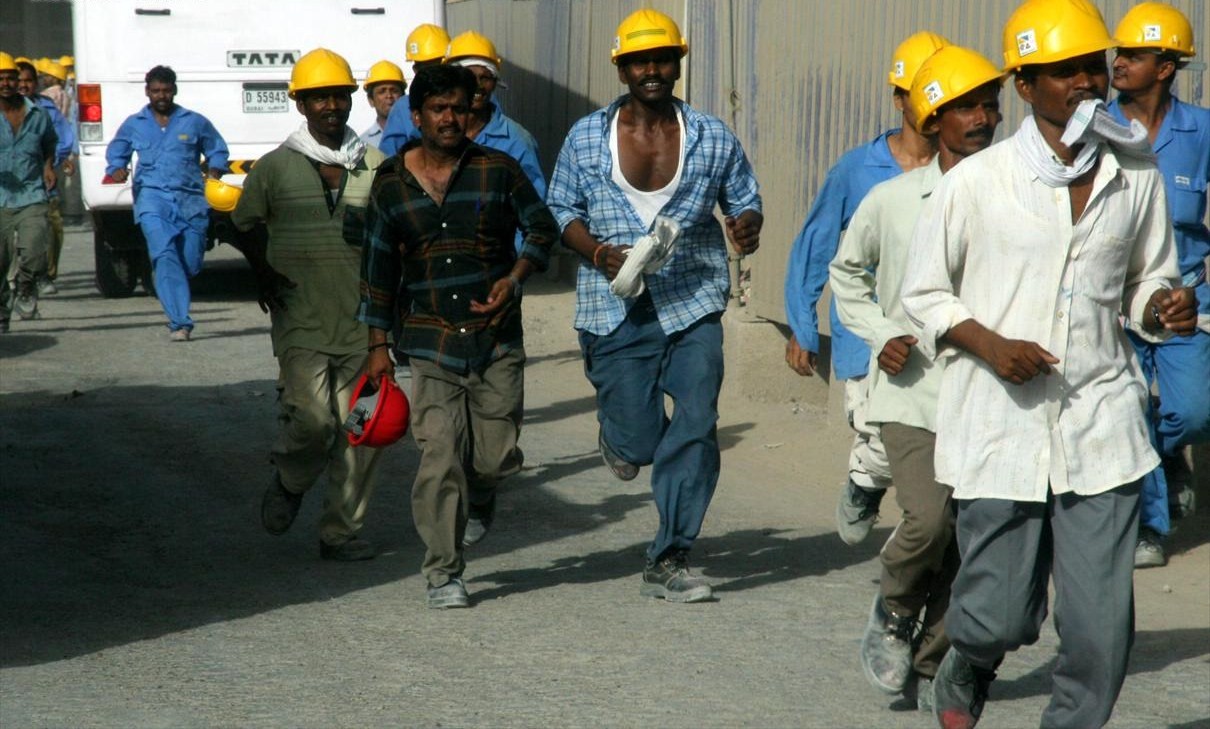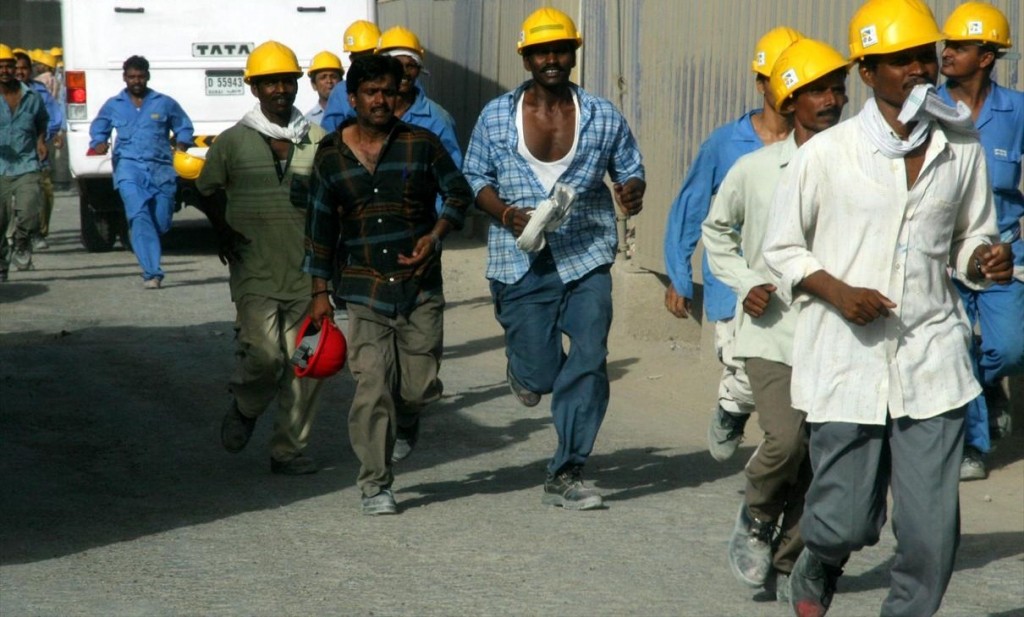In this blogpost, Priyanka Kansara, Student, National Law University, Jodhpur writes about the new Gujarat Labour Laws (Amendment) Bill, 2015, the features of the bill and the key changes introduced by the bill. She also discusses the impact of such bill on Make in India Campaign as well as the issues which still needs to be addressed by such bill.
Introduction
The Gujarat Labour Laws (Amendment) Bill, 2015 has come up with certain reformatory rather evolutionary ideas for the upliftment of the labour law policies in the State, but several controversies have arisen with this Legislative piece. Certain provisions of the Bill were in contradiction with the Central Labour Laws, mainly with regard to the ‘Compromise Formula’ and ‘amendment in the penalty policies’, etc. The bill has got the assent of the President. With the President giving nod to the new Gujarat Labour Laws Amendment Bill, soon about 1.2 Crore Labourers of Gujarat would get their wages by Cheque directly transferred into their Bank account created under Jan Dhan Scheme.
The Labour Laws Amendment Bill aimed at amending the Employees’ Compensations Act 1923, the Industrial Disputes Act 1947, the Minimum Wages Act 1948, the Motor Transport Workers Act 1961, the Beedi & Cigar Workers Act 1966, the Contract Labour (Regulations & Abolition) Act 1970, the Payment of Gratuity Act 1972, the Equal Remuneration Act 1976, the Building & Other Construction Workers Act 1996, and the Unorganized Workers’ Social Responsibility Act 2008.
Salient features of the new Bill
Presently, if we look into the Criminal Law with regard to the Industrial Disputes, the Court of Judicial Magistrate First Class is overburdened with such cases; it takes several years to get the Judgment for a specific case. The Bill introduces Mediation as an alternative dispute mechanism, through which the labourers can arrive at a compromise with the employer without approaching the Court. This can be done by paying a certain payment/penalty to the Government. With the emergence of this Bill, Gujarat would become the first state to introduce the provision where both parties could end their dispute through a compromise popularly known as “compounding of offences”. The advantage of this policy is that it would reduce the unnecessary and endless hullabaloo in the Judicial Procedure and the Labour Law disputes. Certain offences under certain Laws such as the Motor Transport Workers Act 1961, the Beedi & Cigar Workers Act 1966, the Contract Labour (Regulations & Abolition) Act 1970, the Payment of Gratuity Act 1972, the Equal Remuneration Act 1976 will also be included in this ‘compounding of offences’ policy.
The Bill also allows the State Government to prohibit Labour strikes in the public utility. The new Act seeks to give powers to the Government to prohibit strikes in public utility services in the first instance for one year. This can subsequently be increased up to two years to any number of times. The prohibition of a strike or lock-out in the circumstances enumerated in the Law is based on the scheme of Public Policy. Strikes which commence and continue for an indefinite time are against the Public Policy norms and have some deformative impact on the Industrial safety reforms. We could presume that with the Mediation coming into the picture, the disputes related to the clashes of interests resulted in strike, can be resolved empathically.
The new Law erased ‘hire and fire’ by proposing to lift restrictions on the sacking of Workers and payment of compensation in special investment regions, National Investment and Manufacturing Zone and some other Economic Zone. The Bill also proposes to enhance the entrenchment compensation to 60 days; employees working in large industrial sectors, such as Special Economic Zones, are now entitled to get 60 days of salary if they are laid off by the employer. At present, the limit is 45 days of salary.
The proviso is introduced under Section 22 of the Employees’ Compensation Act 1923, under the Bill, as in the previous provision, it has been stated that no application for the settlement of any matter by a commissioner (other than an application by a dependent or dependents for compensation) shall be made unless and until some question has arisen between the parties in connection therewith which they have been unable to settle by agreement, has been provided with a proviso that if an application by an employee or by dependent or dependents for compensation is not made before the Commissioner within a period of ninety days from the date of the occurrence of the accident, then such application may be filed by an officer authorized by the State Government in this behalf for the purpose of compensation to be paid to such employee or dependent or dependents. It is beneficial for the dependent/dependents, who are less aware of the right entrusted under the Law or could file such applications for Compensation. The Bill further proposes to disburse 75% to 100% of the compounded amount to the affected workers. In some cases, where workers are not indefinable, the compounded amount will be deposited in the Gujarat State Social Security Board.
An amendment was introduced under the Industrial Disputes Act 1947 in proviso to the subsection (n) of Section 2, wherein the period specified under the proviso, in the first instance, exceeded to one year (instead of six months) but may by a like notification, be extended from time to time for any period not exceeding two years (instead of six months), at any one time, if in the opinion of the appropriate Government, public emergency or public interest requires such extension; which means that the Government can now ban the strikes in Public Utility Service for up to one year the first time. Further, in Section 2A(3), for the words three years, the words ‘one year’ has been substituted. Thus, it seems that the intention of the government to pass the Bill is to relax labour laws to give an impetus to industrialisation in the State.
A provision under the Minimum Wages Act, 1948 has amended; under the definition of contractor ‘outsourcing agencies[1]’, which means an agency which by contractual agreement or otherwise provides services or supply employees, was also included, which is in some cases the Government itself. This will attest more powers to the Government. Shops or establishment of factories employing 20 or more manpower shall make the payment of minimum wages through Bank Account. Under the new definition of Outsourcing Agencies’, the Contractor of Service Agencies employing 20 or more Labourers either skilled or unskilled will also pay wages through Bank Account.
Another reformatory step was taken under the Building & Other Construction Workers Act, 1996; employees working as a supervisor also, whose salary is less than three times of Minimum Wages will also be eligible to get the benefit of the Act; previously Supervisors were excluded from taking benefits.
Impact of the Bill on the Make in India Campaign
If any new labour or Industrial Reform Policy emerges, it can be examined under the blueprint of Make in India Campaign i.e. promotion of a simplified and rationalised labour regime aimed at higher productivity and economic growth. Moreover, the Campaign has another policy as to not only to create capital but to create employments also. The provisions under the Bill could have a reformative impact on the domestic campaign ‘Make in India’. Ease of Labour and Industrial Law Policies and Industrial Safety Reforms are the first and foremost requirements if Make in India has to be made successful. Simplification of labour laws can also be one of the key factors on which the government’s Make in India campaign that seeks to turn the country into a global manufacturing hub hinges on.
Such reformations can give recognition to the unsecured labourers also. The inclusion of the Unskilled Workers as an object under the Bill could be proved as a reformatory step as it creates more industrialised environment. Protection of the Labourers and enhancement of the industrial productivity, modernization and competitiveness are the key requirements under the Labour Law Regime, but balance of interest between industries and workers and creating an environment, which is conducive to both the industry and the workers are must in the field of Labour Law Reform Regime.
For the promotion of the Bill, protection, recognition, reformation in Labour welfare policy are the main factors but this is only one face of the coin. India is a labour surplus economy. All the proposed changes, taken together should mean an expansion of the unorganised sector, removal of the instability in employment Policies, but for the Make in India Campaign something more is needed i.e. whether the Bill will be capable of enhancing the economy of the country; whether it has a capability that makes India stand as a Global Manufacturing Hub. One thing is clear; India doesn’t lack creativity, Labour and Labour Laws; what makes it lagged behind others is a lack of full-fledged implementation of the Laws. It cannot be said as to whether the Bill would be proved beneficial for this Campaign or not, but it is certain that the bill will enhance the productivity in the Labour and Industrial areas.
[1] Section 2 (e), the Minimum Wages Act 1948 (Act No. 14 of 1947), 11th March 1947, http://pblabour.gov.in/pdf/acts_rules/inustrial_disputes_act_1947.pdf (accessed on December 3, 2015).
 Serato DJ Crack 2025Serato DJ PRO Crack
Serato DJ Crack 2025Serato DJ PRO Crack










 Allow notifications
Allow notifications


